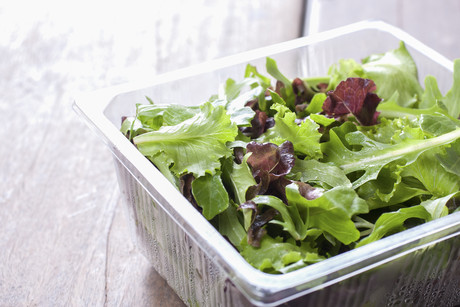Bagged salad and food poisoning

Somewhat of a kerfuffle has arisen following the publication of a University of Leicester article claiming that just a small amount of damage to salad leaves can massively stimulate the presence of Salmonella in ready-prepared salad leaves and that juices released from damaged leaves also had the effect of enhancing the virulence of the pathogen.
Cut leaves in bagged salad leads to a 2400-fold increase in Salmonella pathogen growth and the leached juices also increase the pathogen’s capacity to form a strong and wash-resistant attachment to the leaves, according to the article. The lead author, Dr Primrose Freestone of the Leicester’s Department of Infection, Immunity and Inflammation, said: “Salad leaves are cut during harvesting and we found that even microlitres of the juices which leach from the cut ends of the leaves enabled Salmonella to grow in water, even when it was refrigerated. These juices also helped the Salmonella to attach itself to the salad leaves so strongly that vigorous washing could not remove the bacteria, and even enabled the pathogen to attach to the salad bag container.
“This strongly emphasises the need for salad leaf growers to maintain high food safety standards as even a few Salmonella cells in a salad bag at the time of purchase could become many thousands by the time a bag of salad leaves reaches its use-by date, even if kept refrigerated. Even small traces of juices released from damaged leaves can make the pathogen grow better and become more able to cause disease.
“It also serves as a reminder to consume a bagged salad as soon as possible after it is opened. We found that once opened, the bacteria naturally present on the leaves also grew much faster even when kept cold in the fridge.
“This research did not look for evidence of Salmonella in bagged salads. Instead, it examined how Salmonella grows on salad leaves when they are damaged.”
The article caused a number of fresh salad producers to refute the “ridiculous” study.
“I think consumers understand that there’s no such thing as zero risk,” responded Trevor Suslow, a member of the technical committee of the Center for Produce Safety and an extension research specialist at the University of California-Davis.
Bruce Taylor, CEO of Taylor Farms (US), said in an email: “For 30 years consumers have enjoyed hundreds of millions of bagged salads weekly with great benefit to their health and wellbeing.”
In another email, Jennifer McEntire, vice president of food safety and technology at United Fresh Produce Association, said, “I hope people realise that Salmonella won’t grow in salad, or any other produce, if it’s not there to begin with, and the industry does an incredible job producing safe fruits and vegetables. This study shouldn’t change people’s perception of the safety of these products.”
Will the journal Applied and Environmental Microbiology article change people’s salad eating habits? Probably not — the convenience factor is just too great.
Career upskilling: from food to product development chef
Former chef Zach Baudinet decided to take his years of food experience to the next level through...
A taste of flavours on trend in 2024
Understanding the flavours, ingredients and trends that will shape what we consume is essential...
What's new on the shelf this Easter?
Paper artwork-inspired chocolate eggs, sweet chilli products on show and bite-sized Polly Waffles...












